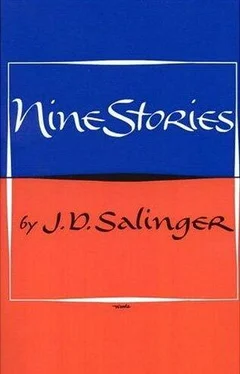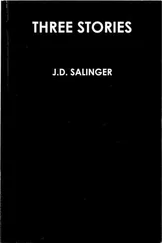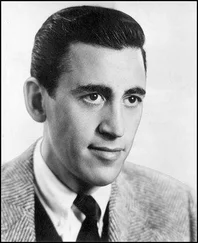Jerome Salinger - Nine Stories
Здесь есть возможность читать онлайн «Jerome Salinger - Nine Stories» весь текст электронной книги совершенно бесплатно (целиком полную версию без сокращений). В некоторых случаях можно слушать аудио, скачать через торрент в формате fb2 и присутствует краткое содержание. Год выпуска: 1953, Издательство: Little Brown, Жанр: Классическая проза, на английском языке. Описание произведения, (предисловие) а так же отзывы посетителей доступны на портале библиотеки ЛибКат.
- Название:Nine Stories
- Автор:
- Издательство:Little Brown
- Жанр:
- Год:1953
- ISBN:нет данных
- Рейтинг книги:4 / 5. Голосов: 2
-
Избранное:Добавить в избранное
- Отзывы:
-
Ваша оценка:
- 80
- 1
- 2
- 3
- 4
- 5
Nine Stories: краткое содержание, описание и аннотация
Предлагаем к чтению аннотацию, описание, краткое содержание или предисловие (зависит от того, что написал сам автор книги «Nine Stories»). Если вы не нашли необходимую информацию о книге — напишите в комментариях, мы постараемся отыскать её.
Nine Stories — читать онлайн бесплатно полную книгу (весь текст) целиком
Ниже представлен текст книги, разбитый по страницам. Система сохранения места последней прочитанной страницы, позволяет с удобством читать онлайн бесплатно книгу «Nine Stories», без необходимости каждый раз заново искать на чём Вы остановились. Поставьте закладку, и сможете в любой момент перейти на страницу, на которой закончили чтение.
Интервал:
Закладка:
“I beg your pardon. I happened to be looking at the floor,” said the woman, and faced the doors of the car.
“If you want to look at my feet, say so,” said the young man. “But don’t be a God-damned sneak about it.”
“Let me out here, please,” the woman said quickly to the girl operating the car.
The car doors opened and the woman got out without looking back.
“I have two normal feet and I can’t see the slightest God-damned reason why anybody should stare at them,” said the young man. “Five, please.” He took his room key out of his robe pocket.
He got off at the fifth floor, walked down the hall, and let himself into 507. The room smelled of new calfskin luggage and nail-lacquer remover.
He glanced at the girl lying asleep on one of the twin beds. Then he went over to one of the pieces of luggage, opened it, and from under a pile of shorts and undershirts he took out an Ortgies calibre 7.65 automatic. He released the magazine, looked at it, then reinserted it. He cocked the piece. Then he went over and sat down on the unoccupied twin bed, looked at the girl, aimed the pistol, and fired a bullet through his right temple.
Uncle Wiggily in Connecticut
IT WAS ALMOST THREE O’CLOCK when Mary Jane finally found Eloise’s house. She explained to Eloise, who had come out to the driveway to meet her, that everything had been absolutely perfect, that she had remembered the way exactly, until she had turned off the Merrick Parkway. Eloise said, “Merritt Parkway, baby,” and reminded Mary Jane that she had found the house twice before, but Mary Jane just wailed something ambiguous, something about her box of Kleenex, and rushed back to her convertible. Eloise turned up the collar of her camel’s-hair coat, put her back to the wind, and waited. Mary Jane was back in a minute using a leaf of Kleenex and still looking upset, even fouled. Eloise said cheerfully that the whole damn lunch was burned—sweetbreads, everything—but Mary Jane said she’d eaten anyway, on the road. As the two walked toward the house, Eloise asked Mary Jane how it happened she had the day off. Mary Jane said she didn’t have the whole day off; it was just that Mr. Weyinburg had a hernia and was home in Larchmont, and she had to bring him his mail and take a couple of letters every afternoon. She asked Eloise, “Just exactly what is a hernia, anyway?” Eloise, dropping her cigarette on the soiled snow underfoot, said she didn’t actually know but that Mary Jane didn’t have to worry much about getting one. Mary Jane said, “Oh,” and the two girls entered the house.
Twenty minutes later, they were finishing their first highball in the living room and were talking in the manner peculiar, probably limited, to former college roommates. They had an even stronger bond between them; neither of them had graduated. Eloise had left college in the middle of her sophomore year, in 1942, a week after she had been caught with a soldier in a closed elevator on the third floor of her residence hall. Mary Jane had left—same year, same class, almost the same month—to marry an aviation cadet stationed in Jacksonville, Florida, a lean, air-minded boy from Dill, Mississippi, who had spent two of the three months Mary Jane had been married to him in jail for stabbing an M.P.
“No,” Eloise was saying. “It was actually red.” She was stretched out on the couch, her thin but very pretty legs crossed at the ankles.
“I heard it was blond,” Mary Jane repeated. She was seated in the blue straight chair. “Wuddayacallit swore up and down it was blond.”
“Uh-uh. Definitely.” Eloise yawned. “I was almost in the room with her when she dyed it. What’s the matter? Aren’t there any cigarettes in there?”
“It’s all right. I have a whole pack,” Mary Jane said. “Somewhere.” She searched through her handbag.
“That dopey maid,” Eloise said without moving from the couch. “I dropped two brand-new cartons in front of her nose about an hour ago. She’ll be in, any minute, to ask me what to do with them. Where the hell was I?”
“Thieringer,” Mary Jane prompted, lighting one of her own cigarettes.
“Oh, yeah. I remember exactly. She dyed it the night before she married that Frank Henke. You remember him at all?”
“Just sort of. Little ole private? Terribly unattractive?”
“Unattractive. God! He looked like an unwashed Bela Lugosi.”
Mary Jane threw back her head and roared. “Marvellous,” she said, coming back into drinking position.
“Gimme your glass,” Eloise said, swinging her stockinged feet to the floor and standing up. “Honestly, that dope. I did everything but get Lew to make love to her to get her to come out here with us. Now I’m sorry I—Where’d you get that thing?”
“This?” said Mary Jane, touching a cameo brooch at her throat. “I had it at school, for goodness sake. It was Mother’s.”
“God,” Eloise said, with the empty glasses in her hands. “I don’t have one damn thing holy to wear. If Lew’s mother ever dies—ha, ha—she’ll probably leave me some old monogrammed icepick or something.”
“How’re you getting along with her these days, anyway?”
“Don’t be funny,” Eloise said on her way to the kitchen.
“This is positively the last one for me!” Mary Jane called after her.
“Like hell it is. Who called who? And who came two hours late? You’re gonna stick around till I’m sick of you. The hell with your lousy career.”
Mary Jane threw back her head and roared again, but Eloise had already gone into the kitchen.
With little or no wherewithal for being left alone in a room, Mary Jane stood up and walked over to the window. She drew aside the curtain and leaned her wrist on one of the crosspieces between panes, but, feeling grit, she removed it, rubbed it clean with her other hand, and stood up more erectly. Outside, the filthy slush was visibly turning to ice. Mary Jane let go the curtain and wandered back to the blue chair, passing two heavily stocked bookcases without glancing at any of the titles. Seated, she opened her handbag and used the mirror to look at her teeth. She closed her lips and ran her tongue hard over her upper front teeth, then took another look.
“It’s getting so icy out,” she said, turning. “God, that was quick. Didn’t you put any soda in them?”
Eloise, with a fresh drink in each hand, stopped short. She extended both index fingers, gun-muzzle style, and said, “Don’t nobody move. I got the whole damn place surrounded.”
Mary Jane laughed and put away her mirror.
Eloise came forward with the drinks. She placed Mary Jane’s insecurely in its coaster but kept her own in hand. She stretched out on the couch again. “Wuddaya think she’s doing out there?” she said. “She’s sitting on her big, black butt reading `The Robe.’ I dropped the ice trays taking them out. She actually looked up annoyed.”
“This is my last. And I mean it,” Mary Jane said, picking up her drink. “Oh, listen! You know who I saw last week? On the main floor of Lord & Taylor’s?”
“Mm-hm,” said Eloise, adjusting a pillow under her head. “Akim Tamiroff.”
“Who?” said Mary Jane. “Who’s he?”
“Akim Tamiroff. He’s in the movies. He always says, `You make beeg joke—hah?’ I love him… . There isn’t one damn pillow in this house that I can stand. Who’d you see?”
“Jackson. She was—”
“Which one?”
“I don’t know. The one that was in our Psych class, that always—”
“Both of them were in our Psych class.”
“Well. The one with the terrific—”
“Marcia Louise. I ran into her once, too. She talk your ear off?”
“God, yes. But you know what she told me, though? Dr. Whiting’s dead. She said she had a letter from Barbara Hill saying Whiting got cancer last summer and died and all. She only weighed sixty-two pounds. When she died. Isn’t that terrible?”
Читать дальшеИнтервал:
Закладка:
Похожие книги на «Nine Stories»
Представляем Вашему вниманию похожие книги на «Nine Stories» списком для выбора. Мы отобрали схожую по названию и смыслу литературу в надежде предоставить читателям больше вариантов отыскать новые, интересные, ещё непрочитанные произведения.
Обсуждение, отзывы о книге «Nine Stories» и просто собственные мнения читателей. Оставьте ваши комментарии, напишите, что Вы думаете о произведении, его смысле или главных героях. Укажите что конкретно понравилось, а что нет, и почему Вы так считаете.











